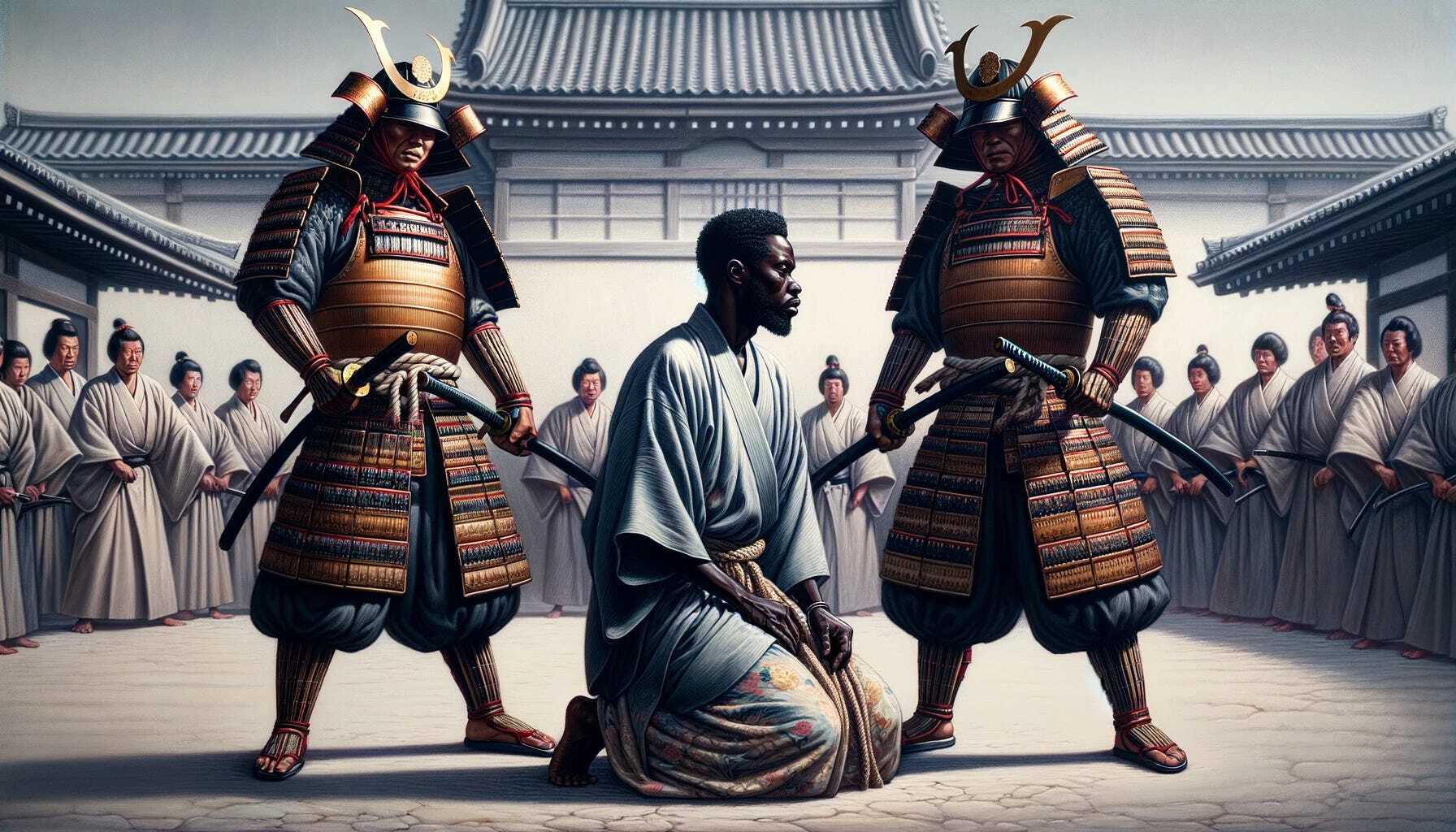
Who was Yasuke? Yasuke was a legendary African samurai who served under the powerful Japanese warlord Oda Nobunaga in the late 16th century. Born in Mozambique, Yasuke arrived in Japan in 1579 as a servant to an Italian Jesuit missionary. His towering height, dark skin, and immense strength fascinated the Japanese, leading to his introduction to Nobunaga. Nobunaga was so impressed by Yasuke's physical prowess and loyalty that he granted him the rare honor of becoming a samurai. Yasuke's story is a unique blend of African and Japanese cultures, making him a historical figure of great intrigue. From battles to court life, Yasuke's journey is a testament to the extraordinary paths history can take. Ready to dive into 37 fascinating facts about this remarkable warrior? Let's get started!
Key Takeaways:
- Yasuke, an African samurai in 16th century Japan, defied cultural boundaries and inspired stories, movies, and even a Netflix anime series.
- His legacy challenges traditional narratives, showcasing the global nature of history and the power of cultural exchange.
Who Was Yasuke?
Yasuke, a name that resonates with intrigue and mystery, was an African samurai who served under the Japanese warlord Oda Nobunaga during the late 16th century. His story is a fascinating blend of cultural exchange, loyalty, and martial prowess.
- Yasuke arrived in Japan around 1579, accompanying Jesuit missionary Alessandro Valignano.
- He was originally from Mozambique, though some sources suggest he might have been from Ethiopia or Sudan.
- Yasuke's height, estimated at 6 feet 2 inches, was extraordinary for the time, making him a towering figure in Japan.
- His dark skin fascinated the Japanese, who had never seen an African before.
- Nobunaga, impressed by Yasuke's strength and stature, took him into his service.
- Yasuke's name in Japanese characters is 弥助, which can be translated as "Yasuke" or "Yasufe."
- He was given a residence and a ceremonial katana by Nobunaga, signifying his status as a samurai.
- Yasuke's role included serving as Nobunaga's bodyguard and attending important meetings.
Yasuke's Life as a Samurai
Yasuke's life as a samurai was marked by loyalty and bravery. He quickly adapted to the ways of the samurai, earning respect and admiration from his peers.
- Yasuke participated in several battles alongside Nobunaga, showcasing his combat skills.
- He was present during the Incident at Honnō-ji in 1582, where Nobunaga was betrayed and forced to commit seppuku.
- After Nobunaga's death, Yasuke briefly served Nobunaga's son, Oda Nobutada.
- Yasuke's fate after the fall of the Oda clan remains unclear, with some accounts suggesting he returned to the Jesuits.
Cultural Impact and Legacy
Yasuke's story has left a lasting impact on both Japanese and global culture. His unique journey from Africa to Japan continues to inspire and captivate people around the world.
- Yasuke is often depicted in Japanese art and literature as a symbol of strength and loyalty.
- His story has been adapted into various forms of media, including books, movies, and anime.
- In 2019, a Netflix anime series titled "Yasuke" was released, bringing his story to a global audience.
- Yasuke's life challenges the traditional narrative of samurai history, highlighting the diversity within the samurai class.
- His story has sparked interest in the historical connections between Africa and Japan.
Historical Significance
Yasuke's presence in Japan during a pivotal period in its history adds a unique dimension to our understanding of the era. His life provides valuable insights into the cultural exchanges between Africa and Japan.
- Yasuke's arrival in Japan coincided with the Sengoku period, a time of social upheaval and military conflict.
- His service under Nobunaga placed him at the center of significant historical events.
- Yasuke's story illustrates the global nature of the 16th-century world, with people and ideas crossing continents.
- His life challenges the notion that samurai were exclusively Japanese, showing the inclusivity of the samurai class.
Yasuke in Modern Media
Yasuke's story has transcended time, finding new life in modern media. His journey from Africa to Japan continues to inspire creators and audiences alike.
- Yasuke has been featured in several historical novels, blending fact and fiction to tell his story.
- The 2017 film "Yasuke" was announced, with Chadwick Boseman set to play the titular role, though it was never completed.
- Yasuke's story has been the subject of numerous documentaries, exploring his life and legacy.
- The character of Yasuke has appeared in various video games, often portrayed as a powerful warrior.
- Yasuke's tale has inspired musicians, with songs and albums dedicated to his legacy.
Yasuke's Influence on Popular Culture
Yasuke's influence extends beyond historical accounts, permeating popular culture in various forms. His story resonates with themes of bravery, loyalty, and cultural exchange.
- Yasuke has become a symbol of multiculturalism and diversity in historical narratives.
- His story has inspired comic book creators, leading to graphic novels that explore his adventures.
- Yasuke's life has been celebrated in art exhibitions, showcasing his impact on Japanese culture.
- His tale has influenced fashion, with designers drawing inspiration from his unique blend of African and Japanese heritage.
- Yasuke's story has been referenced in music, with artists using his name and legacy in their lyrics.
Yasuke's Historical Context
Understanding Yasuke's life requires a look at the broader historical context of his time. His journey from Africa to Japan was part of a larger pattern of global exploration and cultural exchange.
- The 16th century was a period of significant exploration, with Europeans traveling to Africa, Asia, and the Americas.
- Jesuit missionaries, like Alessandro Valignano, played a crucial role in facilitating cultural exchanges between different regions.
- Yasuke's presence in Japan highlights the interconnectedness of the world during this period.
- His story provides a unique perspective on the impact of European colonization and missionary activities in Africa and Asia.
- Yasuke's life challenges the traditional narrative of isolated cultures, showing the fluidity of cultural boundaries.
Yasuke's Enduring Legacy
Yasuke's legacy endures, continuing to inspire and captivate people around the world. His story is a testament to the power of cultural exchange and the enduring human spirit.
- Yasuke's life has become a symbol of resilience and adaptability, inspiring people to overcome challenges and embrace new opportunities.
Yasuke's Legacy Lives On
Yasuke's story isn't just a tale from the past; it's a testament to resilience and adaptability. Born in Africa, he traveled to Japan, becoming a samurai and earning the respect of one of history's most powerful warlords, Oda Nobunaga. His journey from a foreign land to the heart of Japanese culture shows how determination can break barriers.
Yasuke's legacy continues to inspire. His life has been the subject of books, movies, and even anime. People are fascinated by his unique story, which blends different cultures and histories. Yasuke's tale reminds us that no matter where you start, you can achieve greatness with courage and perseverance.
So, next time you think about samurais, remember Yasuke. His story is a powerful reminder of what one person can accomplish, no matter the odds.
Frequently Asked Questions
Was this page helpful?
Our commitment to delivering trustworthy and engaging content is at the heart of what we do. Each fact on our site is contributed by real users like you, bringing a wealth of diverse insights and information. To ensure the highest standards of accuracy and reliability, our dedicated editors meticulously review each submission. This process guarantees that the facts we share are not only fascinating but also credible. Trust in our commitment to quality and authenticity as you explore and learn with us.


